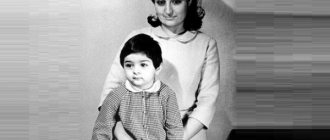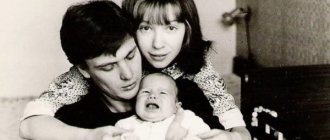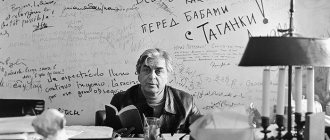Raisa Maksimovna Gorbachev was not understood and not accepted by her compatriots. At the same time, she was idolized abroad. Few in the USSR understood who Raisa Gorbacheva really was. They began to appreciate her only after her death. This article outlines the biography of Raisa Gorbacheva, the first and last Soviet lady, an extraordinary personality who turned the Western idea of a Russian woman upside down.
She differed in her eccentricity from the previous wives of the first secretaries of the CPSU Central Committee. She was not in the shadow of her husband, she was smart, educated and, in the opinion of many, too active. Besides, she looked good - not in a Soviet way. People don't like people who are different from themselves. Originality was especially hard to perceive in the USSR.
Repressed relatives
The biography of Raisa Gorbacheva began nine years before the start of the Great Patriotic War. Her father was a railway engineer who once arrived in the Altai Territory from the Chernigov region. The fate of Raisa Titarenko’s close relatives (that was the name of the heroine of today’s story as a girl) was destroyed by the revolution and subsequent collectivization. The mother's parents were hereditary peasants, they worked hard all their lives, for which, apparently, they suffered - in the thirties they were subject to dispossession.
Raisa Maksimovna’s grandfather, a man who was accustomed to working from dawn to dusk, who read nothing but the local newspaper, and who had a rather vague understanding of Marxism, joined the ranks of “criminals” convicted of Trotskyism. He was judged quickly, according to the then tradition. The only punishment possible for the “enemy of the people” was execution. Raisa Gorbacheva's grandmother could not cope with the death of her husband. Then she became seriously ill and died, leaving her children to fend for themselves.
Raisa Gorbacheva: biography
Raisa Maksimovna Gorbacheva was remembered not only as the first lady of the country and the wife of the only president of the Soviet Union. This woman found the strength to engage in serious charitable activities, her own career, and family life, which, due to the high position of her husband, was entirely on her shoulders.
Video course “Spring”
Landscaping for busy people, a beautiful garden without the hassle
A training course for those who want to make their dacha beautiful and prefer to spend their time, effort and money wisely.
Special offer! 50% discount! Make good use of your self-isolation!
₽ 1200.00 ₽ 600.00
MORE ❯❯❯
Raisa Gorbacheva
Throughout the presidency of Mikhail Gorbachev and even later, the actions of Raisa Gorbacheva were discussed and condemned, but it is safe to say that this woman with a difficult biography was distinguished by enviable strength of character and endurance.
Family
Alexandra Parada married Maxim Titarenko. In 1932, their daughter Raisa was born. Three years later - son Evgeniy, who later became a writer. And in 1938 Lyudmila was born.
Evgeny Titarenko graduated from the Naval School, then received a degree in engineering. He lived in the Donbass for several years - he worked in a mine. In the early sixties, Raisa Gorbacheva’s brother graduated from the Gorky Literary Institute, after which he left for Voronezh, where he spent his last years. Possibly still alive. It is worth telling more about this person. He did not have any significant role in the fate of our heroine. Using his life as an example, one can see in what a distorted form famous people are presented to ordinary people.
Brother of Raisa Gorbacheva
Titarenko has published nine books for children and teenagers. Perhaps I would have done more. The trouble is that the writer suffered from chronic alcoholism, and later, with age, from Alzheimer's disease. Eventually, Titarenko's relatives sent him to a Voronezh psychiatric hospital, where he may still be today. There is no exact information regarding his further biography.
Raisa Gorbacheva caused outrage among some, while others admired her. There were much more of the former during perestroika. But everyone probably admits that she was an extraordinary person. Such people cannot have simple earthly weaknesses, family problems, and especially dysfunctional relatives. Any unsightly information is exaggerated, flavored with lies, sometimes monstrously ridiculous, and then replicated.
Back in the 1960s, when Gorbachev’s name was unknown to anyone, Yevgeny Titarenko gained fame. But he was, as they say, widely known in narrow circles. In one of her interviews, Raisa Maksimovna said: “My brother drank for 30 years, refused treatment, and it became increasingly difficult to find a common language with him.” According to Gorbacheva, he really had literary talent. However, he did not depend on creativity, but on alcohol.
Frank confession of Mikhail Gorbachev: Raisa and I lost our son
Speaking about the activities of Mikhail Sergeevich Gorbachev, one cannot help but recall his wife Raisa Maksimovna. After all, he was connected with her for many years of tender love and touching friendship. Before her, the wives of the country's leaders remained in the shadows - many citizens did not even know what they looked like. Raisa Gorbacheva broke this unspoken tradition. “The only Kremlin wife who weighs less than her husband,” “A communist lady with Parisian chic,” foreign newspapers wrote about her. In her homeland, the people did not like Raisa Maksimovna for a long time...
In 2014, 15 years after the death of the first lady of the USSR, Mikhail Gorbachev shared with Komsomolskaya Pravda his family secret, which even his closest friends did not know.
Wedding in a dietary canteen
“September is a special month for me,” says Mikhail Sergeevich. — And not only because Raisa Maksimovna left (she died of leukemia in one of the clinics in Germany. - Ed.), on September 25, 1953, we registered with her.
Frank confession of Mikhail Gorbachev: Raisa and I lost our son
00:00
00:00
Times were difficult, post-war, we were both students at Moscow State University, I was at the law department, she was at the philosophy department. I don’t have much money, so I had to earn extra money for the wedding: I harvested potatoes on a combine. There was enough for a white dress for the bride, made of chiffon, sewn in the studio. And Raisa had to borrow shoes from a friend. They didn’t even exchange rings at the registry office - I gave her the ring years later.
And the wedding was celebrated only in November. We organized an evening in the dietary canteen on Stromynka, where our hostel is. It turned out to be a student table - vodka, vinaigrette, cutlets.
At first, when we got married, Raisa couldn’t cook at all. I couldn’t even cook noodle soup! Her mother was a housewife, and Raisa was all about her studies: she graduated from school with a gold medal.
- They say that Raisa Maksimovna had a boyfriend before you?
- Not just a boyfriend, they were getting ready to get married! There was this Tolya Zaretsky, a physicist, a good guy. His father worked as the director of the Baltic railway. The mother specially came in a special carriage to evaluate the bride - and spoke out against Raisa. She did not allow her son to get married. So we should thank her. But Raisa and I somehow managed to do it all easily. And for life.
For example, we loved to dance. Once we were invited to a New Year's ball for young people. A waltz started playing. We were so carried away by the dance that the orchestra had already fallen silent, and we were all spinning. We stopped: everyone was looking at us. We lived a fun, happy life!
“They came up with a name for the child: Seryozha”
“It so happened, we just got married, and suddenly the news was that Raisa became pregnant,” continues Mikhail Gorbachev. - But the doctors forbade giving birth. The fact is that a year before, Raisa fell ill and found herself literally on the verge of life and death. A terrible attack of rheumatism, she became all swollen, as if from cotton wool. She couldn’t walk - we carried her on a stretcher with the guys to the hospital. The disease caused a serious complication on the heart.
The doctors told me: “Make a choice: the child may or may not be born, but you will lose your wife. Her heart may not be able to bear it." The pregnancy was terminated. We were told it was a boy.
How Raisa worried and suffered! I reassured him as best I could. But we had already discussed the name: I persuaded him to name his son Sergei, in honor of my father. Sergei Mikhailovich - it would be nice...
Only after a while, when we left for the Stavropol Territory, Raisa felt better. They say climate change has a positive effect. We moved in 1955, and two years later our daughter Irishka was born.
— Who was Raisa herself named after?
“When her father took the baby in his arms after birth, he said: “So pink, like an apple from heaven. There will be Paradise." By the way, my father and mother named me Victor. But a few weeks later my grandfather took me to a neighboring village for a christening. The priest asked: “What should we call it?” Grandfather answered: “Mikhail.” They left it that way.
“Perestroika took my beloved from me”
— Were there crises in your family life, serious quarrels?
- Just minor disagreements. But when we argued about something, she said: “Keep quiet. You only have a silver medal!” (Laughs.)
- Were you jealous of her?
“It happened, although she tried not to let it happen.” There is no love without jealousy. An amazing woman: her father is an employee of an organization that built railways. A simple family, they lived hard, sometimes in carriages, went through nine schools, and were always on the road. But her behavior, manners, attitude to life, style are from a princess! She remained a mystery to me all my life. And how she loved to dress beautifully.
— It was her idea to open the Burda Fashion house in Moscow?
— Yes, she met Madame Anne Burda in Germany. She invited her to the opening of the House in Moscow, which Raisa patronized. She wanted to instill taste in our women.
— They say it was personally upholstered by Yves Saint Laurent...
- This is a legend. She was dressed by female craftsmen from the studio on Kuznetsky Most.
— Margaret Thatcher speaks flatteringly about Raisa Maksimovna in her memoirs. They say that she herself would be happy to wear a suit like the one Gorbacheva was wearing.
- Well, for a woman this is the most important thing (with irony). They were friends. Although Raisa Maksimovna did not get along with people so easily. But if you get together, then the relationship is forever. She was very demanding of herself and her friends.
Moscow State University students Raisa and Mikhail on the eve of their wedding. 1953 Photo: Boris Yurchenko/AP
They communicated with Thatcher in English. But I couldn't. Almost no one from our generation knew foreign languages. Raisa was very educated.
I remember at meetings people often asked: “Raisa Maksimovna, what do you do to look so good?” I immediately said: “She and her husband are lucky!” In response, she usually retorted: “We still need to figure out who was luckier!”
She is a very decent person, vulnerable - she could not stand the injustice. There was so much gossip and absurdity spread around our family... I stopped paying attention to them. And she took everything to heart. It was perestroika that took my wife away from me: experiences shortened Raisa’s life...
I still have her purse
— Raisa Maksimovna began to write a book. She wanted to tell the truth about us, how we live. I told her: “This is politics, you will never prove anything.” She asked: “Will you help me write?” Her purse is still intact, containing letters, sheets, and notes. After she left, I began to sort through the notes. I came across a sheet, and on it was written diagonally in red ink: “What does your heart hurt about?” Ready title... I myself recently finished another book, called “After the Kremlin.” Will be released late this fall.
— Did Raisa Maksimovna help you edit your first books?
— This is our tradition: first, the text is read by those closest to us. Now my daughter read my new book before sending it to the publisher.
— But there is an opinion that you were the conductor of your wife’s ideas, take your famous phrase: “We need to consult with Raisa Maksimovna.”
- No, I made the decisions myself.
— And if you started again, would you like a simple life?
“I wouldn’t trade my life.” But I could have done a lot better, ahead of schedule. It’s a pity that perestroika was not completed; many correct things were planned. But everything I did played its role. The country changed, glasnost appeared.
— Is it a shame that you are criticized in your own country?
- Well, what do you think? Certainly. But I still receive a lot of good letters. I have friends. Most of them are women. I don't feel lonely or forgotten. Lonely in only one respect - that Raisa is not there.
Mikhail Gorbachev with Raisa Maksimovna, her mother Alexandra Petrovna and sister Lyudmila. Ermolaevka. 1955
TOUGH QUESTION
About his wife's brother and prohibition
— What happened to Raisa Maksimovna’s younger brother Evgeny Titarenko?
“It was a big drama; Raisa dealt with it for almost 40 years. He is alive, but, in fact, is excluded from life - alcoholism destroys a person. He did not accept all of Raisa’s attempts to help him. But what a guy he was! Things weren’t going well for my parents in the family, so at the age of 14 he went to naval school. Later he graduated from the literary institute, wrote, and quite talentedly, for teenagers. But I tried to take on something serious - and completely failed. When he came to visit us, the drinking bouts began. I was already the secretary of the Central Committee, suddenly we were informed that her brother was sitting drunk in a public garden nearby. He came from Voronezh to Moscow and is looking for us.
They assigned him to a special hospital, but nothing worked there either. I think the situation with Raisa’s brother also weakened him in many ways. I was very worried about him.
— They say it was because of his drunkenness that you came up with prohibition?
- There is no need to exaggerate. Booze drove many people crazy in those years. They drank everywhere. Even at the department at the university: Raisa was an assistant professor, and she was instructed to go buy sausages for a snack! The Central Committee and the government were inundated with indignant letters “do something.” Leonid Ilyich, who himself loved to drink, gave instructions to find a way out of how to save society from continuous drunkenness.
It got to the point that there were up to 17 liters of pure alcohol per capita (including children). There is a scientific conclusion: a society where they drink 18 or more liters per capita is destroying itself! I became secretary general. And this report comes to me. We were going to introduce measures: to regulate prices, assortment - everyone drank only vodka, and there were almost no dry wines, even beer... Yegor Kuzmich (Ligachev, then secretary of the CPSU Central Committee - Ed.) and Mikhail Sergeevich Solomentsev (member of the Politburo) were responsible for implementing the plan . - Ed.). They screwed up! The discussion was about replacing wine varieties with table varieties. But they turned everything inside out and brought it to the point of stupidity. I did not give the go-ahead to cut down the vineyards!
BY THE WAY
What did the wife of the President of the USSR do?
Together with academician Dmitry Likhachev, she founded the Soviet Cultural Foundation in the late 1980s and contributed to the return of Russian cultural property from abroad.
She initiated the opening of museums, including those of Andrei Rublev, Nicholas Roerich, and Marina Tsvetaeva. She oversaw projects for the restoration of churches destroyed during the years of Soviet power.
She helped children who survived the accident at the Chernobyl nuclear power plant, patronized the Central Children's Hospital in Moscow, and was the honorary chairman of the international association “Hematologists of the World for Children.” The Institute of Pediatric Hematology and Transplantology today bears the name of R. M. Gorbacheva.
The British magazine Woman's Own named Raisa Maksimovna “Woman of the Year” (1987). In 1988, Raisa Gorbacheva was awarded the Women of the World Prize, and in 1991, the Lady of the Year Prize.
x HTML code
Documentary chronicle: Raisa and Mikhail Gorbachev. “Alone with Myself” - a new book by the first and last president of the USSR will be published soon
FROM THE HOURS
Mikhail Gorbachev: “To marry Raisa, I worked all summer on a combine harvester”
In reflections on life, Mikhail Sergeevich returns to his roots, then talks about how he studied at the Law Faculty of Moscow State University, how his views were formed, remembers fellow students, his work in his native Stavropol region, then “goes through” again all the circles and stages of the Soviet apparatus system with its secret springs, nooks and traps. In short, the book provides answers to many questions that the “Gorbachev phenomenon” raises in us (read more)
The story of a wasted talent
The few readers of Titarenko speak positively of his books, but without much enthusiasm. This was, apparently, a man of tragic fate. Unfortunately, there are millions like him in Russia. Untalented, but lacking the ability to fight a national disease that destroys not only the authors of ordinary children's stories, but also great prose writers and poets, whose names are unlikely to ever be forgotten.
The trivial story of Yevgeny Titarenko was not suitable for the “yellow press”. Another one was needed - sharp, shocking, albeit unreliable and devoid of the author's logic. And dozens of articles began to appear in the press about a cynical woman who had made her way to power and betrayed her loving brother. That is, about Raisa Gorbacheva.
The biography of the most talented writer and lover of truth would have turned out brilliantly if Raisa Maksimovna had not hidden him in a hospital behind a high iron fence. For life. From now on he is cut off from the outside world. This is the widespread version circulating in the press before and after Gorbachev’s death, but that’s not all.
Journalists sometimes allegedly entered a closed area, slowly talked with a patient in a hospital room... Then they published another sensation: the writer is sane, not at all insane. And in fact, he does not need treatment, since he did not particularly abuse alcohol. His only fault was that he knew too much. What kind of secret information killed the presidential relative and failed classic, no one has ever answered. The story with its twisted plot ended here.
Childhood and adolescence
Let's return to the life of the First Lady of the USSR, or rather, to the early period of her biography. Early forties. The father works on the railroad, and therefore the family is forced to move frequently. He is an experienced engineer, he is constantly sent from one city to another. Meanwhile, children change schools and adapt to the new environment. Under such conditions, school performance declines. But Raisa Titarenko studied with straight A's.
In 1949, our heroine graduates from school with a gold medal, which allows her, bypassing the entrance exams, to become a student at Moscow State University. When the war began, Raisa Titarenko was nine years old. Reading the autobiography of a person who experienced these terrible years in childhood and adolescence, you will certainly find memories full of bitterness and pain.
In 1991, at the request of foreign publishers, Raisa Gorbacheva wrote a book about her life. She spoke briefly about her parents, about her mother’s father, who was first dispossessed and then shot. Most of the book, of course, is devoted to the life that began after meeting the future president. Not a word about the war. It was as if she had passed by the Titarenko family.
Gorbachev did not talk about the early 1940s either in her memoirs or in numerous interviews. Perhaps the wife of the last Secretary General deliberately avoided this topic. Or everything that happened before marriage has already lost its former meaning for her.
One way or another, the story about the father returning from the front and the general national happiness that came on a clear May day will not be here. In the life of every person there is a period, sometimes very small, which he considers the most important. And everything else is just background. For Gorbacheva, the years of “Perestroika” became such a decisive period in her life. Let's get closer to the main part of our story.
First Ladies: Raisa Gorbacheva
01 The position of First Lady in the USSR did not exist, not only by definition - despite all the slogans about female-male equality, Russian women were not allowed into big politics. So, sit on the presidium with a postive look, nothing more. But still, most of the top officials of the Soviet state had life partners. Well, we briefly dealt with the Leader of the Nations. Then there was Nina Petrovna Khrushcheva, then Victoria Petrovna Brezhneva. Both of them appeared in public as First Ladies only occasionally, when it was impossible otherwise. And thank God, to be honest. Photo by N.P. Khrushcheva next to Jacqueline Kennedy went around the whole world and hardly contributed to improving the image of our country. But Nina Petrovna was a very intelligent, well-educated and strong-willed lady. But the appearance... hmm. The same can be said about Victoria Petrovna, who was not interested in politics, did not meddle in her husband’s affairs, but rather put things in order in the Kremlin kitchen, for which many thanks to her. In fact, often and quite successfully, the role of the First Lady of the USSR was played by the now living Valentina Vladimirovna Tereshkova, who only became more attractive and elegant with age.
But Soviet times have sunk into oblivion. We turned our faces to the West, and we needed a real First Lady, a modern one, glamorous, independent and self-confident. And we got one like this. Her name was Raisa Maksimovna Gorbacheva.
She was born on January 5, 1932 in the Russian outback, Altai Territory, in the family of a railway engineer. So she and her brother and sister had a good start, and they all took advantage of them well. Despite the fact that, due to her father’s profession, the family often moved, Raisa Titarenko graduated from school with a gold medal and entered the Faculty of Philosophy of Moscow State University. Her future husband, Mikhail Gorbachev, also studied there (by the way, a school silver medalist), who successfully mastered the craft of a lawyer.
... Rotating, due to family connections, among people of a certain position, the author of these lines heard a certain story - as if young Mikhail Sergeevich had another sweetheart before the pretty, smiling Raechka. That girl allegedly did not accept the advances of the provincial with a characteristic accent, declaring that “he will not move further than the chairman of the collective farm.” But the smart Raya Titarenko didn’t think so, took the situation into her own hands and, you see, she made the right decision.
It’s no secret that the Gorbachev couple, who had been together since 1953, were connected by deep love, tender and reverent, which they never hid (but in no case advertised!). The young people left for the Stavropol region, where Mikhail Sergeevich was assigned, and Raisa Maksimovna had to leave her full-time graduate school. In 1957, their daughter Irina was born, and the young family lived modestly even by the standards of those times, in a rented room, only on the salary of the head of the family, a Komsomol worker. Raisa Gorbacheva herself worked here and there - there was no permanent job for the capital-trained philosopher and sociologist, but they say correctly - those who want, look for a way, those who don’t want, look for a reason. She gives lectures from the Knowledge Society, teaches at the Agricultural and Medical Institute of Stavropol, collects material for her dissertation, in a word, she is always on the job.
“Her example is a lesson to others” - to love her husband and, living by his interests, not to dissolve in him without a sediment (as other “theorists” of gender relations demand from women), to be his support, but also to remain a thinking, active person... Worthy of imitation ! In 1967, Raisa Maksimovna defended her dissertation on life material collected during trips to that agricultural region, which were led by her husband. In the same year, he received a diploma of a second higher education - they, one might say, followed parallel courses and at the same speed.
The life of the family changed dramatically at the end of the stagnant 70s, when M. S. Gorbachev, who had been a member of the CPSU Central Committee since 1971, was transferred to work in Moscow, already the secretary of the Central Committee. Even the Kremlin elders, who were far from the realities of life and the people, were clear that the government needed renewal. These people breathed a sigh of relief when, after a tragicomic series of three short reigns, in 1985 the young, only 54-year-old, Secretary General Gorbachev came to power. So Raisa Maksimovna became, in fact, the First Lady of the USSR.
And this is where the problems began. She was ready to play this role. But the country’s population was not ready to see her – or anyone else, it doesn’t matter – in this role.
“Why is she always with him? What does she want? - both women and men asked irritably, seeing Raisa Maksimovna next to her husband in the chronicle. Arguments such as the fact that the wife of the head of state is an official position, and not a marital status, simply did not reach the public. No one wanted to understand that the diplomatic protocol developed over centuries requires the presence of a spouse next to the heads of state in almost all events. Otherwise, confusion, unnecessary rumors and discussions in the yellow press arise. And the ladies’ outfits should be special, determined by the tradition of such events, because the First Lady is, if you like, the face of the country. And Gorbachev was accused of some kind of crazy luxury, which never happened... And how should the First Lady of the richest country dress?! In a faded flannel robe?
People were annoyed by her mentoring tone in which she spoke in public - “why is she teaching everyone?!” But she really taught all her life - it’s her job, her second nature, why not? Raisa Maksimovna was smart, well educated and knowledgeable about the situation in the country. She had something to say. Maybe they envied her natural grace, innate sociality, and ability to deftly wear suits? It cannot be ruled out. Well, the main object of a woman’s fierce envy is a handsome, loving, non-drinking (!!!) husband - but who in Russia will forgive such a thing?!
Raisa Gorbacheva served as First Lady from March 11, 1985, when Gorbachev became Secretary General, until the end of 1991, when he resigned as President of the USSR. Whether the wife of the General Secretary of the Communist Party could be considered the First Lady is no longer so important. The important thing is that the whole world saw her in this capacity, and it was pleasant to look at her. Yes, she made small mistakes in etiquette and clothing - but exactly the kind that any Soviet citizen who was not spoiled by special wealth and numerous trips abroad would have made.
As the companion of the author of radical reforms, she was next to her husband during the coup attempt in 1991, and then rightly fearing for his and her life, she suffered a mini-stroke.
Among the things that Raisa Maksimovna has done, “abusing” her marital status, is the creation of the Culture Fund (1986), support and creation of new museums, and charity. Then, in the dashing 90s, they forgot about the Gorbachev couple - there was no time for that... And they remembered only in 1999, when she became seriously ill. Perhaps the long stay near the nuclear testing zone had an effect. Then, against the backdrop of the past years and events, the attitude towards Raisa Maksimovna... no, did not change. It just returned to normal. She was bombarded with letters wishing her a speedy recovery, but...
When, unable to cope with her illness, she left, she was seen off on her final journey with handwritten slogans “Forgive us, Raisa Maksimovna!” For what? For unfair treatment, for backward views on the role of the wife of the head of state. It turned out that she never found a replacement for the post of First Lady, even if the companions of the leaders of the countries formed from the fragments of the USSR were quite worthy persons. None of them possessed her grace and charm...
Whether we like it or not, Raisa Maksimovna Gorbacheva remained the First and Last Lady of that power that no longer exists.
Sadly? No. But it's a fact
Students
So, Raisa Titarenko is a student at the Faculty of Philosophy of Moscow State University. This is where the happy time begins. The student period cannot be different. But most importantly, it is within the university walls that a girl from Siberia will meet a man who will have to destroy the wall that has divided the main German city into two parts for almost thirty years.
In Moscow, the heroine of our article began a new life. Raisa communicated with interesting, intelligent people, among whom Yuri Levada, who years later became a famous political scientist and sociologist, especially stood out. And already in the first months of study I met law student Mikhail Gorbachev. Their pedigrees were remarkably similar. The young man’s relatives also suffered from repression; his grandfather, like Raisa’s grandfather, was accused of Trotskyism. They quickly found a common language.
Like an apple from heaven
When giving the girl a name, Raisa’s father did not even think about the Arabs. He weighed the baby in his palms: “So small, pink... An apple of heaven... It will be heaven.” The girl was the first-born, and her parents treated her with special tenderness, although they did not spoil her. There was no time for self-indulgence: Rain’s father was a worker on the railway, he and his family were “switched” here and there, sometimes in very spartan conditions. When Raisa grew up, she had to constantly change schools. It was impossible to make friends, only to communicate while they allowed us to communicate. Raya went into reading.
The father of the future first lady, Maxim Titarenko, came to Siberia from Chernigov. In Siberia, he met the daughter of fellow settlers, Shura Parada. Under the tsars, a whole wave passed from European Russian and Ukrainian lands to Siberia, to develop the sea of “no man's” land. Shura’s family did not miss their chance, and by the time of her birth, the Parades were running a strong, prosperous economy.
After the birth of Raya and her younger brother, Zhenya, sad news came: brother-in-law's father was arrested for resisting collectivization. They shot him as a Trotskyist, his family was dispossessed. My brother-in-law's mother died of hunger.
Shura's happiness was that she lived far away. Relatives of those executed “for political reasons” were hunted down, suspected of complicity. And many were judged “on politics” at that time: bonuses were rarely given for solving criminal offenses, but for political ones they were mandatory. So they attributed theft to sabotage, hooliganism to anti-government agitation, not to mention simply trumped-up charges. The more money you get, as you know, the more you want.
The war affected the Siberians in its own way: trains with evacuees arrived in the southern lands. Sometimes they were terribly emaciated from hunger. Almost always - bitten by lice. Many children came without parents. The war began in the summer, and children were hastily taken from children's camps, from the summer cottages of kindergartens, from sanatoriums. My heart broke when the kids were unloaded, and they asked vying with each other: where is mom, when can I see mom? Raya lived near the railway, she spent all day watching the trains with evacuees, helping to receive children from the carriages.
After the war, Raya Titarenko graduated from school, to the delight of her parents, with a gold medal. In 1949, this meant going to any university of your choice, without exams. Raya did not waste time on trifles. I chose Moscow State University.
There, at Moscow State University, she met Mikhail Gorbachev, then, in their youth company, simply Misha. After three years of courtship, she got married. The wedding took place in the dining room of the student dormitory, where else? Contrary to rumors, not all students at Moscow State University were criminals. Soon after the wedding, the newlyweds left for the Stavropol Territory for twenty-three long years.
Marry a Reformer
Three years have passed. There were also no plans to build a wall, which in the 60s Europeans would call “shameful.” Raisa Titarenko married Gorbachev. After 34 years, a former law student will receive a letter from the President of the United States asking him to demolish the many kilometers of fortification. He will fulfill the request - he will tear down the wall. In addition, the Iron Curtain will be lifted and glasnost will be announced. Europeans will call him “the great reformer of the 20th century.”
Family life
On September 25 they went to the registry office. There were no wedding rings. The wedding was celebrated two weeks later. For a modest student celebration, the newly-made husband spent all the savings he earned from the summer harvest. For the first time, Raisa ordered a dress made of expensive material from the studio. Later, both ordinary Soviet women and sleek bureaucratic wives would dissatisfiedly discuss her excessive love for clothes. But that will come later. And first, the Gorbachevs will have to endure a chronic lack of money, an unsettled life and other difficulties.
However, this is still not difficult to bear. Almost all Soviet citizens lived this way, and few imagined a different existence. There are truly serious challenges ahead. In 1954, Gorbacheva suffered a serious illness, after which doctors did not recommend that she give birth. She didn't listen to their opinions. The first pregnancy had to be artificially terminated. But even after this, Raisa Maksimovna did not stop. In 1955 she gave birth to a daughter, Irina.
Activities of Raisa Gorbacheva
Arriving with her husband in the Stavropol Territory in 1955, for the first few years Raisa could not find work in her specialty. The young family had to be content with the earnings of Mikhail, who was involved in the local structures of the Komsomol.
In 1959, the wife of the future General Secretary of the CPSU Central Committee still managed to find a job. For several years she was a lecturer at the Stavropol branch of the Knowledge Society and a philosophy teacher at the local agricultural institute. At the same time, Raisa Maksimovna was engaged in research work in the field of sociology, which became the basis for her future dissertation.
In 1978, the Gorbachevs returned to Moscow. Mikhail Sergeevich continued to work in party organs, and Raisa Maksimovna taught philosophy at her native university. She was engaged in this activity until 1985, when her husband took the main post in the leadership of the Soviet Union.
In the West
Pierre Cardin himself appreciated the taste of the Soviet first lady. American ministers and their wives were captivated by their broad outlook, their ability to carry on a conversation on any topic, both in Russian and in English - everything that was discussed with anger for five years in kitchens, in smoking rooms, in queues, everywhere. Why could one not love Gorbachev’s wife? What could be so annoying about her? Raisa Maksimovna sought to correspond to the image of the wife of the head of state, accepted throughout the world. But the Soviet people were not ready for this. Women who were unable to buy even a simple thing, tired of life’s difficulties, could not help but be angered by Gorbacheva’s impeccable appearance. Poverty breeds anger and envy.
The relationship between the president and his wife caused particular hostility. For almost half a century, the Gorbachevs were inseparable, which gave rise to many anecdotes. Even the most touching things, those outside of politics, evoked ridicule and mockery.
This kind of love only happens in a fairy tale. In real life it is extremely rare. The negative reaction to happiness in the president's family is easy to explain. People don't like fairy tales. If these stories are not about them.
After resignation
The history of the beginning of the century was repeating itself - the country was heading towards collapse, and angry citizens were “washing the bones” of the leader and his wife who had lost authority.
For the first time, Soviet people experienced some kind of compassion for Raisa Maksimovna after they saw footage of the Gorbachevs’ return from the three-day “Foros captivity.” The “First Lady” did not look like herself; he looked tired and confused.
Article on the topic
The will of not the people. How the history of the USSR ended
However, this was just an episode. In December 1991, Mikhail Gorbachev recognized the collapse of the USSR, although he expressed disagreement with it, after which he changed his office in the Kremlin to an office in the Gorbachev Foundation.
Citizens of the former USSR had no time for Raisa Maksimovna: some tried to survive in the fire of armed conflicts, others could barely make ends meet under the weight of “shock therapy.”
The Gorbachev family did not know such troubles. They were still welcome in the West, and at home they retained privileges that allowed them to avoid the problems that ordinary citizens experienced.
Stories in the media about the next visit of the retired president and ex-“first lady” to a Western country did not add points to them in the eyes of their compatriots.
Prisoner of the Gorbachev family. Why is Raisa Maksimovna’s brother being kept in a psychiatric hospital? More details
Death of Raisa Gorbacheva
Everyone who watched TV in the summer of 1999 knows how Raisa Gorbacheva died. In June, he was diagnosed with leukemia. The health status of the ex-president's wife was reported in every news release. The struggle for life did not last long - only three months. The likelihood of recovery was too low. All Russian channels announced where Raisa Gorbachev would be buried on September 20, 1999.
Here you can paraphrase the words of the writer. Post-Soviet people are ordinary people. They envy and hate, but sometimes mercy knocks on their hearts. Before her death, Raisa Maksimovna received many letters with words of support. “In order to be understood, you need to get sick and die,” said the wife of the last secretary general, who became a symbol of change for many.
Raisa Maksimovna Gorbacheva is buried at the Novodevichy cemetery. The grave of one of the most influential women of the 20th century is located near the columbarium, near the central alley. In 2000, a bronze monument made by F. Soghoyan was unveiled here.
About the personal life of Mikhail Gorbachev
Mikhail Sergeevich Gorbachev (born March 2, 1931, the village of Privolnoye, North Caucasus Territory, now Stavropol Territory) married once. His wife was Raisa Maksimovna Gorbacheva (1932-1999) - a strong, strong-willed woman with a keen sense of justice. On Wikipedia, as well as on Mikhail Sergeevich’s personal website, you can see archival photos of this couple.
In the photo: Raisa Gorbacheva and Mikhail Gorbachev in their youth
Mikhail Gorbachev first met his future wife at a dance while still studying at Moscow State University. He studied at the Faculty of Law, and she studied at the Faculty of Philosophy. Raisa Titarenko was distinguished not only by her beauty and charm, but also by her intelligence, modesty and determination. Their student wedding was modest. It was organized in 1953 in the student canteen. The students in love did not have a lot of money, only the money that the young man earned during his student holidays.
The only daughter of the Gorbachev couple was born in 1957. The girl was named Ira. Irina Mikhailovna Virganskaya has two children: Ksenia Virganskaya-Gorbacheva (born 01/21/1980) and Anastasia Virganskaya (born 03/27/1987). Irina herself was married twice. Her first husband, a doctor at City Hospital No. 1 in Moscow, Anatoly Olegovich Virgansky. Married to Irina from 1978 to 1993. Her second husband is Andrey Mikhailovich Trukhachev (married since 2006). Irina Mikhailovna herself is a doctor, vice-president of the Gorbachev Foundation.
Mikhail Gorbachev and his daughter Irina











